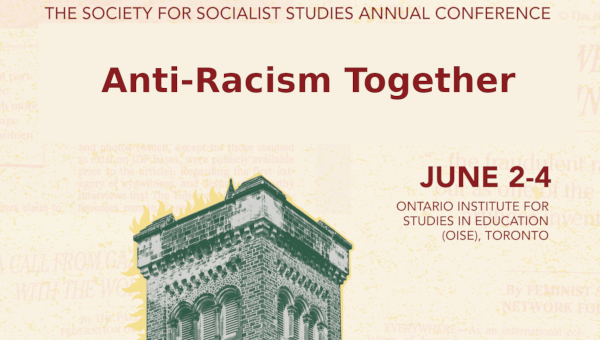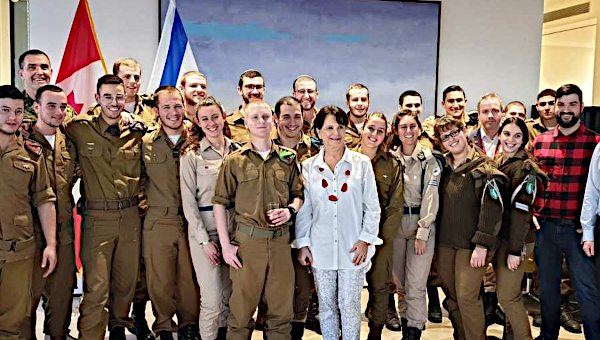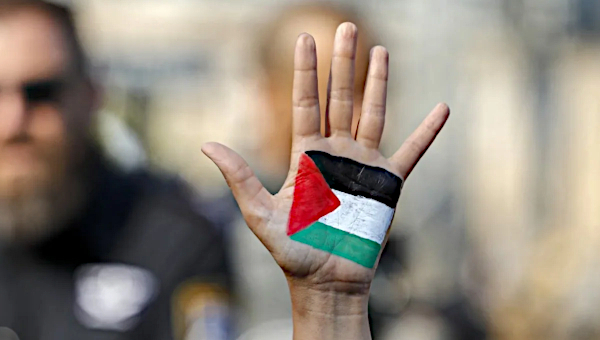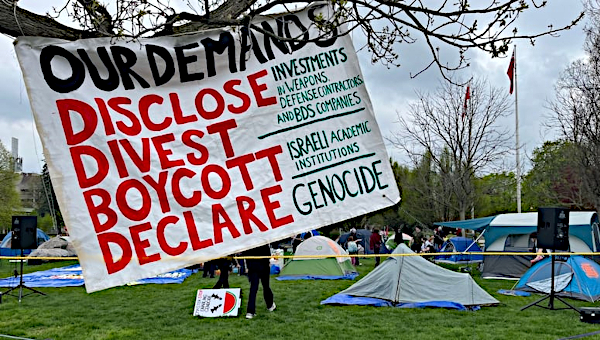COVID-19 in Gaza
The Covid-19 pandemic is confronting governments around the world with an emergency health situation, requiring self-isolation, population lockdowns of many economic activities and households, mass virus testing, screening and hospitalizations, and much more. In areas of the world in the midst of armed conflict, military occupation, hosting refugee camps, or large pools of migrant workers, harsh living conditions are becoming spaces of extraordinary vulnerability to the pandemic and what Friedrich Engels once called “social murder.”
In this context, Socialist Project reaffirms our commitment to the longstanding international demand that Israel end its illegal occupation of Palestinian land, and the brutal siege on Gaza. It is imperative that Israel work to restore access to water and electrical power, and immediately lift all restrictions on medicines and equipment necessary to deal with the pandemic.
The global health crisis makes these needs particularly acute. We insist that primary responsibility for the suffering Palestinians face is the neo-colonial occupation, in the form of the apartheid regime that Israel has constructed with the compliance, and indeed support, of the most powerful states in the international community, under which they live. We call on governments to stop colluding with Israel in their silence, military contracts, and investments and the need to deepen the campaign of Boycott, Divestment, Sanctions (BDS). It is this political system, not merely an act of nature, against which we must mobilize an international response of immediate relief for the health emergency, and of struggle and solidarity.
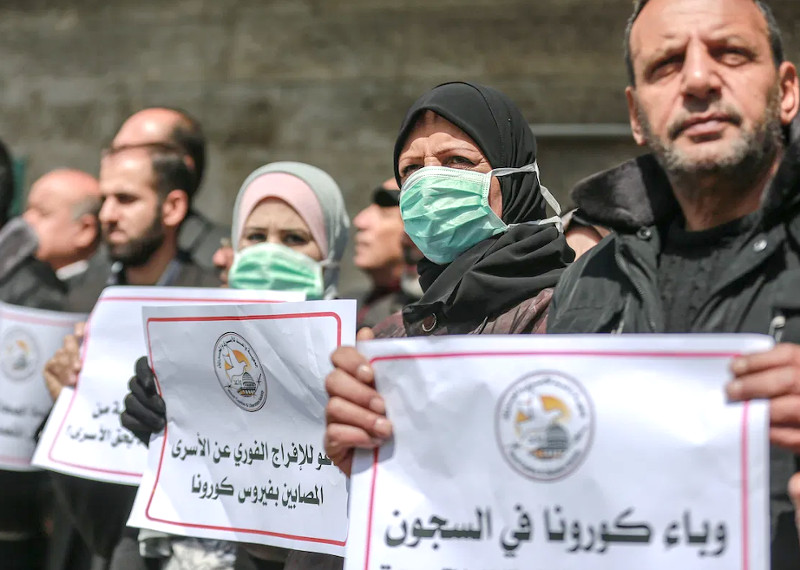
The spread of COVID-19 into Gaza is an anticipated disaster – and possibly a holocaust given the region’s living conditions – that is still preventable if immediate measures are taken. Gaza is one of the most densely populated areas of the world, and has been under Israeli siege for 13 years. Israel has so far blocked all efforts to break the siege it has imposed on Gaza: most recently, through its harsh reaction to the Great March of Return, killing of activists on the Mavi Marmara who were bringing medical supplies to Gaza, and subverting legal challenges to its innumerable violations of international law.
Israeli Prime Minister Netanyahu has further just demanded sanctions “against the International Criminal Court, its officials, prosecutors, everyone.” Allied governments have sought to suppress criticism of Israel by criminalizing Boycott, Divestment, and Sanction (BDS), which has been the primary form international solidarity efforts have taken in recent years.
The pandemic crisis is a vivid illustration of the continued colonial project of the Israeli state over the Palestinian territories and lands. Israel retains extensive control over the Palestinian Authority’s tax revenues, and thus over government expenditures, including for healthcare. Israel maintains military and administrative control over the West Bank and Gaza. We join those around the world in condemning the ongoing illegal Israeli occupation and colonization of Palestinian land, including its brutal siege on Gaza. Further, we demand that all possible pressure be brought to bear on Israel to expediently allow all necessary medicine and humanitarian aid to reach the Palestinian people. In doing so, we emphasize that the current public health crisis is sharply intensifying the ongoing humanitarian disaster created by Israel’s imprisonment of the population of Gaza, carried out with the collaboration of Canada, the US, and their regional allies.
The COVID-19 Situation in Gaza
As of April 4, there were twelve Covid-19 cases in Gaza. The Hamas government in Gaza has ordered the closure of all restaurants and cafes, wedding halls, and the suspension of Friday prayers and weekly markets. Nevertheless, there is little space for physical distancing because of high population density. For instance, in Jabalia, the largest of Gaza’s eight refugee camps, 110,000 people live in an area that is just 1.4 square km. Food is still entering Gaza through Karm Abu Salem crossing.
At this time, a field hospital partly funded by the World Health Organization has been established at the Rafah Crossing. It has a 38-bed treatment facilities, including six Intensive Care Unit (ICU) beds. There are only 70 ICU beds in all of Gaza, and 2500 hospital beds altogether. So far, only 92 tests for Covid-19 have been administered.
In order to treat patients with COVID-19, Gaza will need equipment that is prohibited by Israel from entering. There is an immediate need for some 150 ventilators. Dr. Mona El-Farra, the health chair of the Palestine Red Crescent Society in Gaza, underlines the urgency: “We have, up to this minute, just around 20 kits for diagnosis [and] at the moment we have 2,500 people in quarantine.”
According to Munir al-Bursh, head of the pharmacy department at Gaza’s Ministry of Health, hospitals, pharmacies, and clinics are facing shortages of 149 medicines, equipped with only 69 per cent of what is needed. Food insecurity affects 72 per cent of households and half the population relies on food distribution by the United Nations. Exports from Gaza are almost completely blocked, imports and transfers of cash are severely restricted, and the flow of all but the most basic humanitarian goods are suspended.
Furthermore, Israel’s destruction of Gaza’s water and sewage system makes it much harder to maintain the required standards of hygiene. Physicians for Human Rights/Israel has called for the immediate provision of basic antiseptics, intensive care beds, ventilators, and alternatives for patients who need critical surgery or treatment that is currently unavailable.
Qatar has begun distributing aid to hundreds of residents in the Gaza Strip who are in isolation centers. The Qatari envoy to the Gaza Strip, Muhammad al-Amadi, states that the aid is part of the $150-million aid that the Emir of Qatar recently announced, which will be distributed over six months. The assistance provided includes food, appliances, and power supply to the isolation centers.
The Siege and War on Gaza
The 1947 partition of Palestine, creating the Israeli state, and subsequent war included the expulsion of over 700,000 Palestinians from their villages. Between 160,000 and 190,000 of these refugees fled to the Gaza Strip. The second large wave of refugees into Gaza came with the 1967 Six Day War, when Israel established the occupation over the remaining Palestinian territories in the West Bank and Gaza. At the same time, military order No. 92 gave the military all authority over water. Similarly, order No. 158 gave the military authority over the permit system for houses, roads and water infrastructure, allowing the military to confiscate water resources and destroy wells and rooftop cisterns. Israel also prohibits Gaza from developing and using the offshore natural gas deposits discovered in the 1990s.
While Israel unilaterally dismantled all 21 Gaza settlements in 2005, it maintained full control of all land, sea, and air access to Gaza. Contrary to Israel’s claims, every UN Special Rapporteur for Human Rights in the Occupied Territories affirmed that Israel remains the occupying power under the Geneva Conventions. Since this so-called “disengagement,” Israel has deliberately diminished Gaza’s health system, including through prohibiting the importation of a long list of so-called “dual-use” items (claiming possible military applications). These include medical supplies like glycerin and hydrogen peroxide, which is used as a disinfectant. By 2006, there were no first-line pediatric antibiotics available, most diagnostic laboratory equipment was not functioning, and 19 per cent of essential medicines were unavailable.
After Hamas was democratically voted into power in 2006, Israel imposed a harsh siege on Gaza in 2007, and launched four full-scale military attacks against Gaza: Operations Summer Rains (2006), Cast Lead (2008-09), Pillar of Sand (2012), and Protective Edge (2014). In these assaults, Israel used disproportionate force against a civilian population that had nowhere to flee, used unconventional weapons, and destroyed the power infrastructure which disabled water purification and sanitation. As human rights organizations have affirmed, the siege on Gaza and Israel’s regular military attacks constitute collective punishment of a civilian population.1
Using advanced military weaponry, Israel targeted the health sector, bombing hospitals and ambulances, the medical depot of al-Shifa Hospital, killed medics and doctors, prevented evacuation of the wounded, and used unconventional weapons such as white phosphorus and Dense Inert Metal Explosives (DIME). The 2014 attack on Gaza left 500,000 displaced people, the destruction or severe damage of more than 20,000 Palestinian homes, 148 schools, and 45 primary healthcare centres. As many as 247 factories and 300 commercial centres were destroyed. In this last year, the Israeli military targeted clearly identified medical workers in the Great March of Return.
Under the siege, 70 per cent of infants aged nine months suffer from anemia. It is estimated that 13-15 per cent of Gaza’s children are stunted in growth due to malnutrition. In late 2008, Amnesty International reported that Israel barred infants from leaving Gaza for life-saving cardiovascular surgery. About 290 Palestinian patients died within two years after the imposition of the siege, with 35 per cent of the deaths being children. To date, parents of children admitted to Israel for medical care are generally prohibited from accompanying their children.
In the Israeli wars on Gaza, children were targeted and killed as they played on the beach or on the rooftops of their homes. Moreover, Defense for Children International has long documented Israel’s punitive judicial and military practices against Palestinian children. Israeli air force deploys sonic booms nightly over Gaza, which has caused night terrors and bedwetting. From 2000, it was reported that Israeli soldiers targeted the knees and eyes of children and adults, intentional injury that caused lifelong crippling.2
Violations of International Laws and Norms
Israeli historian Ilan Pappe has called Israel’s strategy the ‘incremental genocide’ of the Palestinian people. Senior Israeli General Gadi Eisenkot describes the “Dahiya Doctrine,” named after a Lebanese village it destroyed in its 2006 bombing of that country:
“We will wield disproportionate power against every village from which shots are fired on Israel, and cause immense damage and destruction. From our perspective, these are military bases… This isn’t a suggestion. This is a plan that has already been authorized.”
In 2012 it was revealed that in early 2008, Israeli authorities drew up a document calculating the minimum caloric intake necessary for Palestinians to avoid malnutrition, so that it could limit the amount of foodstuffs allowed into Gaza without causing outright starvation.
Despite extensive documentation of Israel’s atrocities, powerful states across the world (including Canada), the major world powers constituting the UN Security Council, innumerable professional bodies, anti-nuclear weapons organizations, and even human rights NGO’s obfuscate, exceptionalize Israel, or remain silent about Israel’s crimes.
Israel has bombed, with impunity, the entire life-sustaining infrastructure of Gaza. Unless the Israeli siege of Gaza is entirely dismantled, the many warnings that Covid-19 pandemic could well be a holocaust could well become a reality.
For the last 13 years the international community has been fully informed that Israel has undermined and robbed Gaza of the necessities of life. The Canadian and Global Left is now confronted with parallel global emergencies that require urgent global action against great economic and military power. In January 2009 Israeli journalist Gideon Levy wrote “someone has to stop this rampant madness. Right now.”3
For Palestinians living in Gaza, the West Bank, and Israel, it’s past time to restore all water and 24 hour access to electrical power, and for Israel and the international community to provide all essential medicines, nutrition, and equipment necessary to deal with the pandemic and with other urgent health needs. It’s time to open up the borders of Gaza and the West Bank so that patients are able to access the care they need. And crucially, it’s past time to end the cruel military and prison regime, planned prior to World War II and subsequently implemented with the acquiescence of the international community. •
Endnotes
- Israel’s wars, see Norman Finkelstein, Gaza: An inquest into Its Martyrdom, Oakland: University of California Press, 2018. Also see Henry Siegman’s “Israel’s Lies.”
- Tanya Reinhart.
- Gideon Levy, The Punishment of Gaza, London: Verso, 2010, p. 106.


